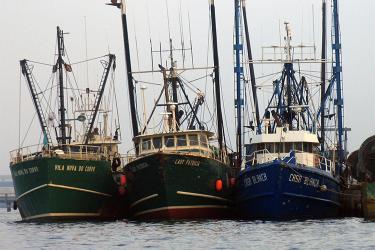The United States is home to some of the largest and best managed marine fisheries in the world. We have both the opportunity and responsibility to advance sustainable conservation and management practices on the high seas, and to support other nations in achieving similar outcomes.
Last month, NOAA Fisheries scientists represented the United States at annual meetings of the International Commission for the Conservation of Atlantic Tunas (ICCAT) Standing Committee on Research and Statistics. The meetings provided a unique opportunity to collaborate on an international level to translate fisheries science into actionable knowledge. This will benefit communities around the Atlantic Ocean that rely on these species for livelihoods, recreation, and culture.
The meetings were held from September 18–29 in Madrid, Spain. NOAA Fisheries scientists joined colleagues from more than 30 nations around the world. They reviewed scientific work conducted throughout the year and condensed scientific results into management advice. In the first week, species-specific working groups were tasked to conduct research on and to assess the status of stocks managed by ICCAT. The Standing Committee on Research and Statistics Annual Meeting took place in the second week. Delegates at this meeting drafted scientific advice on Atlantic albacore tuna, blue shark, and sailfish. They continued to develop and implement Management Strategy Evaluations for Atlantic bluefin tuna, western skipjack tuna, northern albacore tuna, and northern swordfish.
The Role of the Standing Committee on Research and Statistics in Managing of Highly Migratory Species
Tunas, swordfish, billfish, and several species of sharks are considered Highly Migratory Species, meaning they cross international maritime boundaries throughout their lifetimes. Management of these valuable species, therefore, requires international cooperation among scientists and fishery managers from across several nations. ICCAT is the international organization responsible for managing tunas and “tuna-like” species in the Atlantic Ocean. This includes adjacent seas such as the Mediterranean, the Gulf of Mexico and Caribbean (the ICCAT Convention Area).
ICCAT is responsible for the international management of the Atlantic stocks of:
- Bluefin tuna
- Albacore tuna
- Bigeye tuna
- Yellowfin tuna
- Skipjack tuna
- Sailfish
- Swordfish
- Blue marlin
- White marlin
- Spearfish
- Various species of small tunas
- Several species of sharks
ICCAT is also responsible for implementing measures to reduce bycatch of these fisheries, such as sea turtles and seabirds. The U.S. delegation to the Committee is one of 57 ICCAT members and cooperating non-members that participate in ICCAT.
The Committee’s annual meeting enables international scientists to review the scientific outcomes of research programs and stock assessments conducted throughout the year. They discuss the state of ICCAT stocks, and develop consensus advice to provide the best science-based management advice to ICCAT fisheries managers. The Committee is responsible for collecting and analyzing data on fishing activities in the ICCAT Convention area and tracking the state of each stock. They share the latest fisheries statistics with ICCAT in advance of the Commission meeting in November. The Committee also coordinates international research activities, pursues capacity development programs, completes stock assessments, and advises ICCAT on a variety of conservation measures.
U.S. Leadership in the Standing Committee on Research and Statistics
NOAA Fisheries scientists contribute to the Committee by:
- Leading stock assessments
- Providing expertise on the biology of sharks, sea turtles, tunas, swordfish, and billfish
- Serving in leadership positions
Dr. Craig Brown, Research Fisheries Biologist at the Southeast Fisheries Science Center, is currently the Committee Chair. Many other NOAA Fisheries Scientists participate in working groups and other Committee roles.
Dr. Shannon Cass-Calay, Head of the U.S. delegation stated, "I am proud and humbled to lead such a talented team of scientists. Our team is hard-working, mission-driven, and possesses state-of-the-art technical skills. These attributes make us highly sought after as leaders at the Committee."
Fish Stocks Evaluated by the Committee
Atlantic Albacore
The Committee reviewed the adopted management procedure and potential exceptional circumstances for Atlantic albacore tuna. They agreed it was appropriate to continue to use the adopted management procedure to generate total allowable catch through 2026. It also reviewed and adopted a new stock assessment and determined that albacore is not overfished, nor undergoing overfishing. This stock assessment will form the reference case for a new Management Strategy Evaluations, which will include testing new potential management procedures.
Blue Shark
The Committee is also responsible for conducting stock assessments for shortfin mako, porbeagle, and blue shark. It conducted a stock assessment for blue shark in 2023. Based on the results, the Committee determined North Atlantic blue shark is not overfished and not being subjected to overfishing. It determined that South Atlantic blue shark stock is not overfished but is currently subject to overfishing.
Sailfish
Earlier this year, the Committee conducted a sailfish stock assessment. This stock is currently managed as two geographically distinct stocks—the eastern Atlantic stock and western Atlantic stock. The Committee determined that the eastern stock of sailfish is not overfished nor subject to overfishing; the western stock of sailfish is overfished but not subject to overfishing.
Swordfish
During 2023, the SCRS completed a Management Strategy Evaluation and tested a number of options to try to meet management objectives for swordfish. They will present these results to ICCAT at its annual meeting this November. The Commission will use these results to choose among recommended management strategy options for implementation in 2024. It will be the third stock managed by ICCAT using these management procedures.
Atlantic Bluefin Tuna
The Commission adopted a management procedure for both the western Atlantic and eastern Atlantic and Mediterranean in 2022. It linked eastern and western area Total Allowable Catches under one management framework. The final remaining task for full adoption of the management procedure is to define exceptional circumstances protocols. These allow for suspending or modifying application of the management procedure under particular conditions. The Committee will evaluate the updated indices of abundance for determination of these circumstances annually.
Tropical Tunas
The Committee is also responsible for evaluating and providing management advice on tropical tunas, which include skipjack, yellowfin, and bigeye. This year, the Committee developed responses to the Commission regarding the effectiveness of spatial closures to reduce mortality of juvenile tuna and the evaluation of candidate management procedures for the western stock of skipjack tuna through Management Strategy Evaluations. The Committee also reviewed the advances made for the multi-stock Management Strategy Evaluations for tropical tunas. They will pave the way to develop multi-stock candidate management procedures that will demonstrate management trade offs in the multispecies fishery.
Cutting Edge Science
NOAA is exploring advanced techniques for assessing migratory fish stocks. These include genetic analyses to evaluate where stocks spawn, and close-kin mark-recapture methods to estimate total spawning population size. NOAA scientists are also leading working groups to integrate genetic techniques to Atlantic-wide stocks. Electronic tagging provides essential information on species habitat use, migration routes, and connectivity across ocean regions. The Committee processes this data to evaluate stock distributions and directly estimate migration rates across management areas in mixed stock assessments, such as the Atlantic bluefin tuna Management Strategy Evaluation.
What’s Next
The 28th Regular Meeting of ICCAT will take place in New Cairo, Egypt, in November 2023. The Committee will present its report to the Commission and the Commission will take the Committee’s scientific advice into consideration for fisheries management decisions.
NOAA Fisheries will continue its involvement in these international efforts in order to advance sustainable conservation and management practices across the Atlantic high seas.
More information
- International Commission for the Conservation of Atlantic Tunas
- Atlantic HMS National Reports to the International Commission for the Conservation of Atlantic Tunas
- ICCAT
- Southeast Fisheries Science Center
Major contributions to this story were made by Katie Geddes of the Rosenstiel School of Marine, Atmospheric, & Earth Science at the University of Miami.





